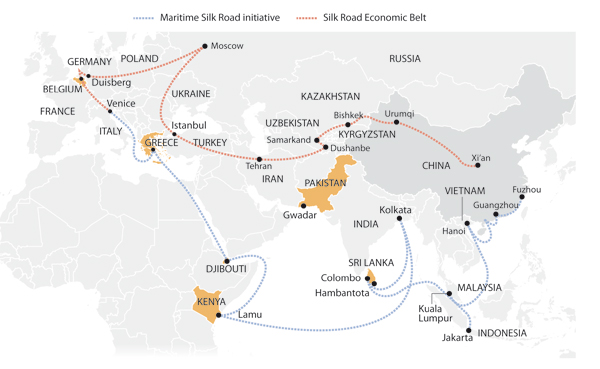
With the elections over in France, world attention would now turn to the One Belt One Road (OBOR) summit in Beijing on May 14 -15. As China’s biggest event of 2017, to be attended by 28 heads of state and government leaders, the OBOR summit would occupy even those staying away from this massive transnational connectivity roundtable.
India has kept out of OBOR — the China-driven plan to revive the ancient Silk Route connecting Asia to Europe via a network of infrastructure projects spanning the two continents.
Just before the curtain goes up on the OBOR Forum, Beijing’s attention would be diverted by Prime Minister Narendra Modi’s visit to Sri Lanka. Modi’s mission, when he travels to the island republic on May 12, will be to enlarge India’s footprint to counter the growing influence of China.
Although Sri Lanka is considered to be part of India’s “zone of influence”, in recent years China’s presence has grown considerably. China has extended huge financial assistance to large-scale infra projects. Under one agreement, Chinese companies have bagged 15,000 hectares in Hambantota, and this is being opposed by former President Mahinda Rajapaksa and was referred to by former foreign minister GL Peiris as a “bad deal”.

China has announced investment in billions for its silk road project to expand commerce — Reuters
Sri Lanka being caught in “China’s embrace” has caused concern, almost alarm, in New Delhi. Sri Lanka is under pressure to sign a free-trade agreement with China. At the same time, Sri Lanka is pushing for an economic and technical agreement with India. New Delhi fears that Sri Lanka might use such an agreement to flood India with Chinese goods manufactured in the island. Therefore, New Delhi has decided to put off signing the agreement until it has a clearer idea of the terms of trade between China and Sri Lanka.
Amid the political opposition to Chinese companies being given land, there are also protests against Colombo’s move to sign a pact with India for an oil storage facility in Trincomalee. Much to New Delhi’s surprise, India seems to be facing more criticism than China though the latter’s schemes of financial assistance are calculated to keep Sri Lanka in a political and economic bind. To make matters worse, Rajapaksa is stoking anti-India sentiments.
The growing Chinese influence in Sri Lanka was one of the reasons that the US-UK led ‘international community’ supported the regime change, which saw President Rajapaksa being succeeded by President Maithripala Sirisena. Earlier, India had rooted for Rajapaksa’s ouster, welcomed Sirisena and, later, Ranil Wickremesinghe as Prime Minister.
Modi is comfortable with Sirisena and enjoys a good personal rapport with Wickremesinghe. However, economic compulsions have precluded any possibility of Wickremesinghe and Sirisena reducing Chinese presence in Sri Lanka. On the contrary, China’s influence is rising. Modi’s visit is actuated by these concerns. It is because of these that Wickremesinghe’s visit last month to India was converted from a private to a state visit.
In capitals across the world, there would be much interest in the moves Modi makes to correct Sri Lanka’s “China tilt”. This won’t please the Chinese on the eve of the OBOR Forum.
The author is an independent political and foreign affairs commentator based in New Delhi.